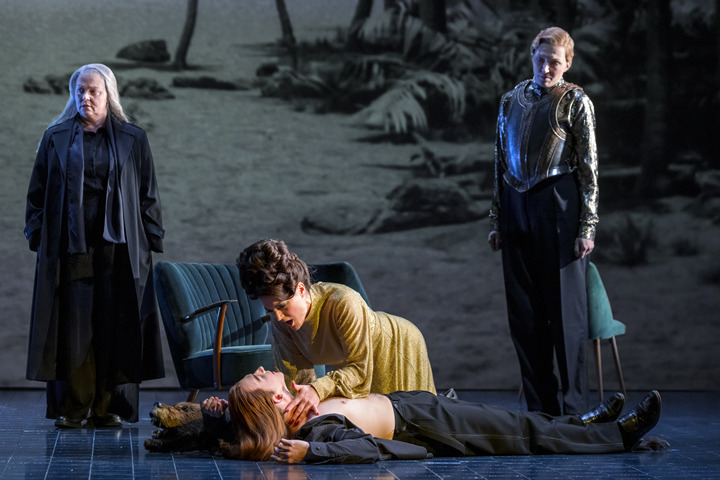| Opera Reviews | 29 April 2024 |
Opera North's new Alcina downplays the sorcery but heightens the relationshipsby Catriona Graham |
|
Handel: Alcina |
|
 |
|
|
Alcina is an opera that requires flowcharts to explain the synopsis. Instead, trust to the performers and Handel’s music, and follow what is happening on stage. The eponymous Alcina is a sorceress, turning lovers to wild beasts when she tires of them. Ruggiero, betrothed to Bradamante, has fallen for Alcina and turned into a spaniel, having his tummy tickled by her and, in a moment of stress, tearing lumps out of a cushion. Ian William Galloway’s black and white video backdrop combines with Hannah Clark’s cocktail lounge set and vintage costumes to create the tropical island paradise of some Bond movies - though Oronte’s black vest and shorts are not exactly Connery’s baby-blue playsuit. Throw in some cross-dressing as disguise, and all is set for confusion and complications - Morgana, Alcina’s wee sister, falls for Bradamante (disguised as her brother) on sight, despite being engaged to Oronte. There are many emotions to be worked through in this opera, with some strong singing. Nearly always there, dressed in black like a duenna / wise counsel / fairy godmother, is Claire Pascoe’s Melissa, re-pitched from bass to mezzo. She shows to Ruggiero (Patrick Terry) the ring he had previously given Bradamante; brought back to reality, he casts off his spanielhood, becomes brisker and is restored to Bradamante. His Verdi prati is gently reflective. Mari Ashvik plays a fairly straight bat as Bradamante. Tall and slim, with a shingled bob, she passes quite well as ‘her brother’, her distaste and pain evident when Alcina and Ruggiero are snogging in public. Máire Flavin’s Alcina is sophisticated and in control, until she realises Ruggiero is leaving her – whereupon she creates herself a cave from the chairs. When she sees he has ‘betrayed’ her, the loss of power hurts; her aria Mi restano le lagrime emerges from her body, which is curled up in a tight ball of pain. Morgana’s attempts to console her are dismissed. Ffur Wyn’s Morgana is a typical wee sister, trying to carve out her own identity against Alcina. Having fallen for Bradamante, her ornamentation entertainingly shrieks to Oronte to ‘gerroff’ and leave her alone. Nick Pritchard plays the straight guy Oronte, but even he is in pain and ends up self-harming as a result of Morgana’s rejection. When she realises the truth about Bradamante, she does not quite fall back into Oronte’s arms, but there is hope they can work something out. Although the orchestra has modern, rather than baroque, players and the sound is, therefore, different, conductor Laurence Cummings brings out some very nice elements, for example the jagged, broken bass-line under Alcina’s pain, or the dark colours underpinning Ruggiero’s coming to his senses. Cummings and director Tim Albery have cut the opera to under three hours, and downplayed the sorcery. Instead, the relationships are to the foreground, with the characters experiencing a loss of trust in those they still love, and wondering if anything can ever be the same again, as the video backdrop speeds us away from the tropical island, which we now know is no paradise. |
|
Photo © James Glossop |
|







